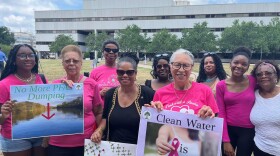Clean drinking water is a human right according to a 2010 United Nations declaration. But recent incidents throughout North Carolina raise questions about whether or not our state is protecting that right for North Carolina residents.
With the discovery of GenX and other contaminants, hog waste lagoon breaches after Hurricane Florence and continued complications from coal ash, the state’s drinking water supply has come under increased scrutiny in recent years. While utility systems manage water quality for those who rely on public water, homeowners who get their water from private wells are on their own when it comes to addressing contaminants.
Jackie MacDonald Gibson talks to host Frank Stasio about common issues with private wells and shares her research showing racial disparities in access to community water supplies in North Carolina. MacDonald Gibson is a professor and chair of the Department of Environmental and Occupational Health at Indiana University and is also a professor of environmental sciences and engineering at the University of North Carolina’s Gillings School of Global Public Health.
Detlef Knappe joins the conversation to share his research on GenX and other emerging contaminants that have been discovered in treated drinking water. He is a professor of civil, construction and environmental engineering at North Carolina State University. And Naeema Muhammad shares her experience helping communities organize to fight against corporations who threaten access to clean water and clear air. She is the organizing director of the North Carolina Environmental Justice Network.
All three guests will be at a panel discussion called “Southern Waters and Environmental Justice” on the campus of the University of North Carolina at Chapel Hill on Thursday, Oct. 24 at 7 p.m.
Interview Highlights
MacDonald Gibson on who relies on private wells for their water in North Carolina:
There are some communities that historically were gerrymandered out of municipal boundaries, even though they're in urbanized areas in the state. They are majority African American communities that — as cities and towns grew — were never incorporated into the cities and towns. And what I have found is that, particularly in those areas, the wells can be at higher risk of contamination than wells in rural areas … Most of the homes as well have septic systems, and when you have a high density of septic systems, you also have increased risks of well water contamination.
When we judge a drinking water as being safe to drink, we really base that on a very, very small picture of what really might be in the drinking water. - Detlef Knappe
Knappe on per- and polyfluoroalkyl substances — unregulated compounds that may have human health effects:
These compounds really surround us. They are [used in] making our carpets and upholstery, water and stain repellent. They are in firefighting foams. They're used to make things like Teflon and other nonstick coatings. And so we are exposed to these pollutants partly through the drinking water [and] partly through exposure in our homes.
Muhammad on the link between environmental injustice and race:
Whenever we talk about environmental hazards, what we always say is anything white people don't want in their backyards — you can find it in eastern North Carolina. - Naeema Muhammad
In North Carolina, for example, we have about 10 million pigs. And of the 10 million pigs, most of them are in eastern North Carolina, which we call the avenue of least resistance. And we've deemed it environmental racism. We don't feel like it was an accident that these animals got there. But that these were targeted communities, which were perceived to not have enough political or economic clout to fight off this industry.















